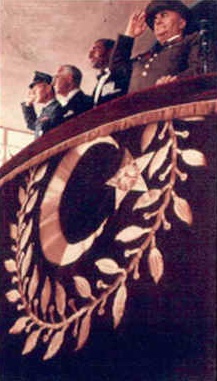Cemal Gürsel
Cemal Gürsel (* 1895 in Erzurum , † September 14, 1966 in Ankara ) was a Turkish general and headed the Committee of National Unity , which put on May 27, 1960 against Prime Minister Adnan Menderes . He was the fourth president of Turkey until March 28, 1966 .
Life
Gürsel was born in Erzurum in 1895 as the son of an Ottoman officer and the grandson of a pasha . After graduating from Ordu Elementary School , he attended the Erzincan Military School and then successfully graduated from the Kuleli Military School in Istanbul . From 1915 he worked as a career officer. He got his nickname Cemal Ağa early on .
Gürsel served in the army for 45 years . He fought in the First World War in the Battle of Gallipoli as a lieutenant . A little later he fought on the Syrian and Palestinian fronts. Gürsel was captured by the British in 1917 and held in Egypt until 1920 . When a foreign reporter later asked him why he had not learned English during his imprisonment , Gürsel replied that his capture frustrated him so much that he learned French instead of English .
After his release, Gürsel returned to Turkey and joined the movement of Mustafa Kemal Ataturk . From 1920 to 1923 he fought in the Turkish Liberation War on the Western Front. For his work in the Battle of Sakarya against the Greeks , Gürsel later received the independence medal from parliament .
Cemal Gürsel married the daughter of a naval officer , Melahat, in 1927 and had a son named Muzaffer.
Military career
Gürsel graduated from the military academy in 1929 as a staff officer. In 1923 he was promoted from regimental to corps commander. Having both commander was an officer's school and staff officer, he was brigadier general in 1946, was in the following years until the general rise - in 1957 he became General of the Army - and took over the chairmanship of the secret service. In August 1958, Cemal Gürsel was appointed Commander in Chief of the Land Forces . At that time he was already in command of the 3rd Army , which was stationed on the border of the Soviet Union . After troops were used against demonstrating students, he gave up his post as Commander-in-Chief in May 1960 in protest against the government.
His easy-going and fatherly manner and his sense of humor made him popular both in the Turkish army and with his NATO partners.
After the military coup of May 27, 1960 , which he led in a leadership role in the Committee of National Unity , Cemal Gürsel began to draw up five-year economic plans (based on the Iranian model). This led to an upswing in the Turkish economy . From May 28, 1960 to October 26, 1961, he was both Prime Minister and Commander-in-Chief of the Armed Forces of Turkey.
In September 1960 he gave the order for a new constitution - "the second Turkish republic", as it was often called, should be based on a democratic constitution. For the first time trade unions, political parties (without judicial permission), student associations and associations existed. Turkey established close relations with the Western European countries, the Middle East countries and the Soviet Union.
With the adoption of the new constitution, he became President of Turkey on October 26, 1961. He held this office until March 18, 1966, when he finally resigned for health reasons.
The politics of the Turkish military changed radically in 1966 after the death of the liberal and often “left-wing” president, and in 1971 it led to a coup by the right-wing military.
literature
- Johannes Glasneck : Biographies on World History , Lexicon, VEB Deutscher Verlag der Wissenschaften, Berlin 1989, p. 218f
| personal data | |
|---|---|
| SURNAME | Gürsel, Cemal |
| BRIEF DESCRIPTION | Turkish general and president |
| DATE OF BIRTH | 1895 |
| PLACE OF BIRTH | Erzurum |
| DATE OF DEATH | September 14, 1966 |
| Place of death | Ankara |


